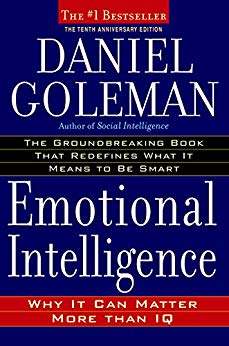

This article is an excerpt from the Shortform summary of "Emotional Intelligence" by Daniel Goleman. Shortform has the world's best summaries of books you should be reading.
Like this article? Sign up for a free trial here .
Traumatic experiences are hard. Trauma and PTSD can seem insurmountable when you don’t understand your emotional reactions and can’t control them.
Once we’ve learned an emotional response to something, the emotion hardly ever changes or goes away–but we can learn to control that emotion and how we let emotional trauma affect our actions.
Review of Trauma and PTSD
Post-traumatic stress distorder (PTSD) occurs when the brain becomes more easily alarmed due to traumatic experiences, making emergencies out of anything remotely resembling a traumatic event or a series of prolonged suffering cruelties.
PTSD also generally stems from traumatic events in which the victim felt helpless. The helplessness is part of what makes the initial traumatic event so overwhelming to the limbic system–it increases the strength of the emotion because the brain feels like there’s no action to take.
This is why people have patterns that show up regardless of the situation–for instance, if we have the emotional trauma in childhood of being emotionally neglected by our parents, and we learn to hide our emotions to avoid the feeling of rejection, then as adults we will respond to any perceived neglect by hiding our emotions, whether the person neglecting our feelings is our boss, our spouse, or our children.
Recovery from Trauma and PTSD
But we can learn to handle our emotions better, as we already know, and PTSD victims can, with treatment, relearn a different, more normal response to their specific triggers. The amygdala will always retain its response to that initial emergency alert, but victims can work on developing an ability to suppress the emergency alert through their rational mind.
Trauma sticks on an unconscious level, so a great way to work through trauma is through art, which also deals with the unconscious. (Shortform note: Goleman does not go into detail as to how art can be used in therapy for this purpose, but there are plenty of good books out there on art and drama as therapeutic techniques.)
Children have an easier time recovering from emotional trauma. Because their brains are still forming, they can use a wider variety of tools to relearn responses–tools like games, dreams, fantasy, and play.
- In 1989, Patrick Purdy, a white supremacist with a criminal record, opened fire with an automatic weapon on Cleveland Elementary School in Stockton, CA. He killed 5 children and wounded 30 others, then shot himself in the head. Children who had survived the attack began playing a recess game called “Purdy,” where one student would be Purdy and try to kill the other students. Sometimes “Purdy” would kill everybody; sometimes the others would kill “Purdy.”
- This game allowed the survivors to replay the event safely, repeating the traumatic event in a low-anxiety setting and desensitizing themselves to it. It also allowed them to change the outcome of the tragedy, giving them a sense of control over the event instead of the helplessness they felt at the time.
If PTSD patients can relearn their responses to traumatic events, than people with less intense but still impactful negative memories can also relearn how to respond. Psychotherapy can help in both instances.
- In one study, psychotherapy was just as effective as Prozac in treating patients with obsessive compulsive disorders–both sets of PET scans showed a significant decrease in activity in the emotional center of the brain.
3 Stages to Recovery from PTSD
There are 3 stages of recovering from trauma:
- Regaining a sense of safety.
- This stage is about calming the triggered emotional circuits enough to be able to relearn a response.
- PTSD victims, during the traumatic event and in the episodes after, feel as though they are not in control of their emotions or bodies–so ideally, patients would find a way to regain a sense of control over what is currently happening to them. Medication can help in this arena–antidepressants help control the activation of the sympathetic nervous system.
- Relaxation techniques are another good tactic, allowing patients to counter the anxiety and agitation of triggered emotional circuits and find a sense of safety.
- Reviewing the details of the trauma and mourning the loss it resulted in.
- Retelling or revisiting the traumatic event in great detail in a safe environment allows patients to come to a more realistic understanding of the memory, as well as their response to it. Therapy helps them do this.
- Putting memories into words is, in a sense, gaining control over them and transferring them from the feeling system to the thinking system.
- Mentally reliving the traumatic event in a safe environment can teach the brain that those two things–safety and the traumatic event–can happen at the same time.
- Trauma always results in loss, so mourning is necessary. Mourning any loss is about acknowledging why that person or thing was important, and beginning to let go of the lost thing. Mourning in relation to a traumatic event can help to let go of the trauma itself.
- Reestablishing a more normal life.
- Once a patient has reduced their physiological symptoms, feels more in control of how they respond to it, and can revisit the traumatic memory voluntarily or put it aside if they choose to, then the patient can start to rebuild their life and reinvest in strong relationships built on trust.
———End of Preview———

Like what you just read? Read the rest of the world's best summary of Daniel Coleman's "Emotional Intelligence: Why It Can Matter More than IQ" at Shortform . Learn the book's critical concepts in 20 minutes or less .
Here's what you'll find in our full Emotional Intelligence summary :
- What are emotions? Why do we have them?
- What is emotional intelligence? Why is it important?
- How do you manage your own emotions? Anger, anxiety, and sadness?
- How can you approach your relationships with more emotional intelligence?
- How can you teach your children emotional intelligence?
- How can emotional intelligence boost your career?






